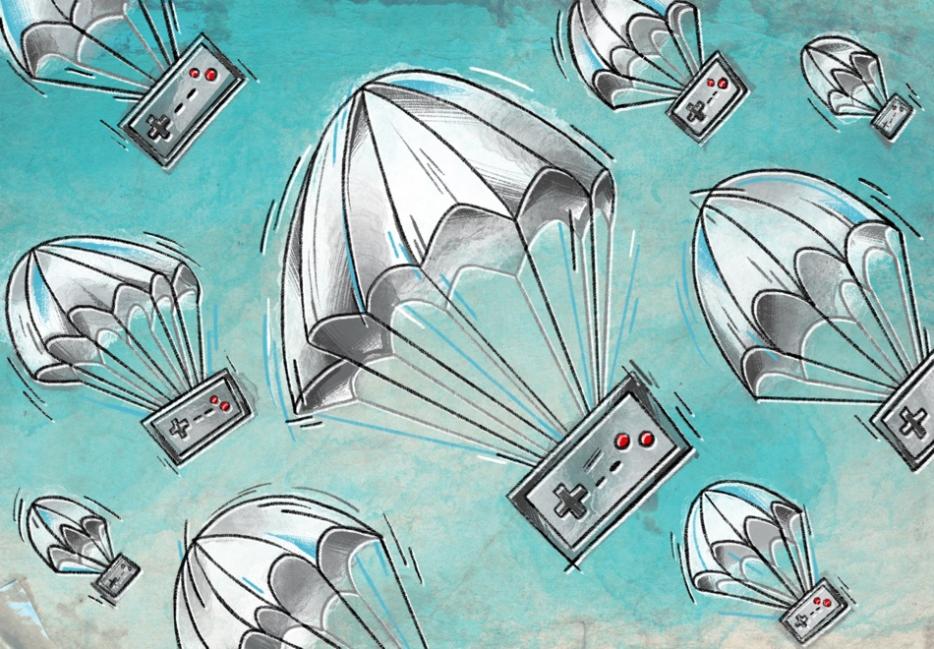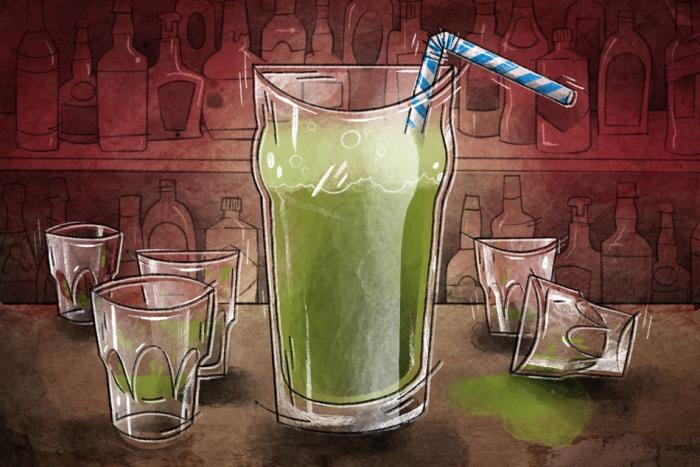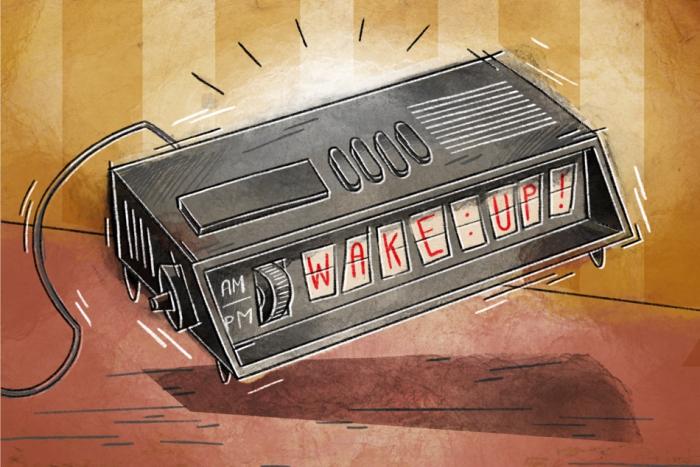What were we obsessed with, invested in and plagued by in 2019? Hazlitt’s writers reflect on the issues, big and small.
I am fantastical—and I don’t mean to enrich myself with the positive connotations of such an adjective in naming myself as such, but rather I mean to say that I am one who conjures fantasies, a mesmer of a man, illusionist. My counsellor told me this during one of my sessions this summer, that in order to heal from the mental processes I was undertaking I must learn to “tame my illusions.” To say I survived the year of all my years would be an understatement: 2019 was a ruination for me in all semblances of the noun. I lost a relationship, I encountered many deaths within my family, and the many diagnoses of sickness or disease that accompanied such a wake. I encountered sexual assault, plunged into a deep depression which brought about anxiety, insomnia, panic attacks, and a brief encounter with suicidal thoughts. I was lost, perhaps I still am, but I exist in the muck of signification and crack Roman Orthography in half in order to climb out—like how an “A,” when spliced, becomes a ladder, and I am simply climbing out of the abyss of signs. I strongly believe that during the latter half of this decade, with our move towards global apocalypse, Indigenous displacement, queer and, more specifically, trans dehumanizations, the TPL, Trump, Alberta’s Conservative Party and their cuts towards education, the TRC, UNDRIP, Standing Rock, and the Trans Mountain Pipeline, wave after wave of negative affect, I broke and yolked into nuclei.
I am a person with privilege, such that I have a steady income, I have kin, family, and dear friends, I have access to mental health services, I have shelter, food, clothing, clean drinking water, and electricity. In 2016, my maternal family lost a great matriarch after years of living paraplegically. With such a loss, my mother and father permanently took in two of her children, now my cousin-siblings, both of whom we have caretaken for since they were babies to ease our wounded matriarch’s responsibilities. I have such fervor for those two, both of whom came from trauma and survived it against all odds as a baby and a toddler. They are now in their adolescent and teenage years, respectively, but I see the negative impacts on their mental health: one with social phobias and another with anxiety and panic attacks. Both have clung to video games as a medium for escapism, entertainment, and social enrichment. Their medium of choice? Fortnite.
Released by Epic Games in 2017, Fortnite is a massively multiplayer shooter-survival video game in which upwards of 100 players are enmeshed in a hyper-comical world wherein a battle royale ensues until it is only you who remains (albeit alone, in a duo, or as a squad of up to four players). Fortnite has been ranked among the most popular games of all time, with an estimated 250 million online registered players. Both my cousin-kin, and many other folks in my life, have attached themselves to this game, playing with friends both near and far into the wee hours of the night to win that battle royale. How I saw them cheer, laugh, scream in anger, and create strong social bonds regionally and globally with players they grew attached to, talked to online, and made community with.
On October 13 of this year, Fortnite, now in its tenth season, got sucked into a black hole, unannounced. This, of course, was a marketing ploy executed by Epic Games in order to usher in the game’s new season. Fortnite stayed offline for two days, but what I surveyed in my cousin-kin was how this was almost apocalyptic. I witnessed how their mental health issues crept back up onto them, their most relied upon tool stolen from beneath their very analogs. I wondered: could such an act be felt as a violence? It surely seemed that way. My cousin-kin and many others mourned, their lovely secondary livelihood swept up into a rapture, a digital cleansing. A popular hashtag emerged: #TheEnd.
I speak upon this if only to preface our, and even more so the younger generation’s, reliance upon escapism through the throes of fantasy. With the inclusion of “gaming disorder” in the 11th revision of the World Health Organization’s International Statistical Classification of Diseases, I do pay attention to the ways in which video games as escapism become coping mechanisms for bubbling or buried valences of mental health, primarily anxiety and depression. Like my cousin-kin, these were mechanisms I have used and use throughout my life in order to escape the damning efforts of being zippered into a body, here a physical but also a cultural, racialized, sexualized, and Indigenized one, that the world often likes to disengage with. As a youth I would flock to the local library for access to the internet where I would engage in online arenas of gaming and socializing through such websites as Pogo.com and Neopets. Keenly, I’d check back every day or two to continue with and stay alongside the communities I had built in these pockets of pixels.
As a teenager I incessantly played the MMORPG Lineage II, in which I made an avatar, an Orc named Zoa (here the progenitor of the protagonist of my book, full-metal indigiqueer), and fostered a beautiful ring of kinship with folks. I played across North America in a “clan” system; together we would hunt for treasure, level up (aka “grind”), go on large scale raids, and often lounge around in the digital pastures of the game’s idylls taking pictures, talking about our personal lives, and sharing stories. This, to me, was a sovereign way of owning a body I had been taught to distrust, because I was queer, Indigenous, and fat, through the fantastical recreation of my imagined embodiment into those of pixels: here I was a muscle queen, a femme Orc with a red mohawk, a monk (often a “brawler” class) who wielded round, sharpened chakrams in both of her fists. I was powerful, haughty, righteous in my beings—though I never really learned to take that much further than the computer screen, at least until adulthood. This, too, came to an abrupt halt when I was no longer able to afford the monthly fee to play the game and thus had to foreclose my account indefinitely—it was a tremendous period of mourning as I lost the kinships I had fostered in those worlds.
I think there are healthy benefits to gaming inasmuch as with moderation, one can learn how to become socially and healthily adept in the worlds we inhabit beyond the realms of coding and to find solace to deal with and unpack mental health and its traumas. This summer, I relied heavily upon video games in order to rejuvenate and heal the central tenets of my being out of, perhaps, a type of stasis. In my experience, gaming is much like charging: the body becomes a console, plugged into its outlet. It recharges while the mind is removed—from the webbing cracks in its exoskeleton that have been formed from the showering of rocks that are thrown at us in our daily lives—and placed into a realm of our wildest imaginations. It’s funny how the mind can be transplanted and live vicariously through a body foreign to its own, how we can inhabit a Strife, a Redfield, or a Croft, and exist simultaneously within two worlds—a lesson I am learning from my own nêhiyâw ways of being within multiplicities of oralities, temporalities, and continuums of worlds in a single moment.
I spent much of my summer playing Fire Emblem: Three Houses, made by Koei Tecmo Games, which released on July 26 of this year. The Fire Emblem series is a highly popular JRPG (Japanese role-playing game) in which you take control of an often-amnesiac protagonist who is the saviour of the world, plunged into a space rife with political strife and warfare. In Three Houses, you can play either as a female or male protagonist named Byleth, within the Kingdom of Fódlan, which is divided into three rival nations at peace after a period of warfare brought about by the archbishop of the Garreg Mach Monastery, a central hub between all three nations. You begin as a mercenary in training under your father and are quickly hired as a professor within the Monastery, which is also an academy full of students from all three nations. You begin the game by picking a nation to ally with and become the head teacher of their class, though you are able to enroll students whom you impress from other nations as you progress. The important processes of this game, though, are tied to its support system—you form friendships and rivalries with your students as you unlock their backstories and connect on an emotional and personal level with their development. Midway through the game, a timeskip happens; your character is plunged into a liminal space and your students age into adulthood.
You reemerge and find your students again only to partake in the now global warfare that is taking place between all three nations and a fallen Monastery—here you can side with your nation or the Monastery to help rebuild (though I often chose to forgo the religiosity of the monastery in order to practice a campy form of digital decolonization). Now, as you are no longer a teacher but a colleague of your previous students, your supports with them can rank up so you can eventually woo, romance, and marry them. The game features an allowance for queer romance within its storylines, a singular one for male players, and several for female players. I played as the male Byleth (who I too renamed Zoa) and enjoyed the narrative of the game, but in my despondency of mental health and the rupturing of some of my relations, I felt it imperative to utilize the game as a medicinal tool. Here, I spent countless hours first teaching, gift-giving, and chatting with the only male-romance option, Linhardt, a genius researcher and scholar who flutters between academic interests and is privy to exhaustion—he will doze off if you bore him—and adamantly schedules nap times (a very astute grad school tactic if you ask me). He consistently ponders ethics and moral decisions around his research (a decolonialist, again, if you ask me) and its applications beyond and within the ivory tower of his academia. Much of my free time was me logging onto the game to see Linhardt, an AI, to talk about reading, fishing, sweets, sleep, and research.
Post-timeskip, he is twenty-one and you are of a similar age, and it’s here where I spent my time wooing him. We would chat on the battlefield and in refuges about the state of affairs and academia’s role in global warfare. Linhardt is a romantic, and after the war is won, proposes to you if you have a high enough support role, which I did. On September 8, 2019, I posted to my Instagram story that after 70 hours I had found a digital nicimos (lover/partner) when he asked, “Would you spend [your] time with me? I want to know more about you, I want to solve the mysteries that surround you, I don’t think I’ll ever meet anyone more intoxicating than yourself.” While filming this touching scene, I audibly aw’d. After you accept his proposal you are given a still of Linhardt lying in the grass, subtly staring at you, noting, “It may be sometime until we can nap beneath a tree, peaceful sunlight filtering through the branches, but when that day comes, to have you there lying by my side? Paradise. And we will have made it so.”
While the politics, mechanics, and animations of the game may sound mundane, this game became a fundamental practice in self-reflection, queer desire, embodiment (digital and physical), and mental health. I say this because, one, it allowed my body to rest while I played and refocused the energies of my whirling mind, one wracked with anxiety, depression, mourning, and loss, to channel its energies into something constructive and enriching: into narrative, plot, metaphor, and agency; and two, the game also asked me to reflect on my own desires, what it is I want and need from the world as a Two-Spirit Oji-nêhiyaw nâpew.
Overtly romantic—as a writer, academic, editor, grad student, and one who often travels for community engagement—it’s a pipe dream to think that I’d have the luxury of an entire day, if not an afternoon, to lounge around napping beneath a tree in total solace with any future nicimos. That said, the idea of stasis, a moment of cathartic encapsulation within the spaces of our relations, that is, the biosphere, askîy, mistikak, or what you may call the “idyll,” seem wholeheartedly akin to how we would think about relationalities through nêhiyâwewin. That is, to love, sâkihitin, is in fact a summoning of a being, perhaps one of braids, into the world that we animate and are accountable to—it becomes more than simply a Western speech act, it is in fact a sacred animation. Furthermore, such a summoning of sâkihitin into orality within the spaces of askîy could be considered an act of wâhkôhtowin—or, enacting relationality within a world, here the land, that asks for us all to humble ourselves from the hierarchy of being wherein “human” is crowned in the ladder of hierarchal verticalities and instead we link hand-in-hand as a rhizome, a plurality of linkages that come together horizontally—“all my relations.” All of this, done together through sâkhitin and wâhkôhtowin would be what I would consider miyopimatisowin, or, “the good life,” an act of being in ethical, respectful, and reciprocal relations with all those we hold as animations (beyond what Western epistemologies would consider inanimate such as trees, rivers, rocks, sky). The game doesn’t imply this, but isn’t that the beauty of literature or narrative? That it’s all a type of virtual play, on the page or on the screen, much to the point that we, as readers or gamers, plug into a world ripe with possibilities and seed our subjectivities into the carefully crafted vantage points that plot always leaves for us?
As Fire Emblem: Three Houses taught me to question my own desires in terms of relations, it mended my body, soothed my razing mind, and corrected my blurred perspectives into clearer optics, freer prairies. Perhaps, yes, fantasy and gaming are coping mechanisms, but what I’ve come to learn through this is that the entirety of pimâtisowin, or the act of living, is, in a sense, a coming to and into an embodied world that acts much like a virtual one. We are always butting up against the coping mechanisms of others: how they perform, their speech acts, how they respond to us, inquire about us, answer us, ignore us, treat us, respect us. I would say that video games taught me to think ethically about engagement, how to converse properly with someone who houses traumas that have been taught, or self-taught, to act, reply, or respond in certain ways from particular cues—much like how I had to select correct and respectful answers when wooing and romancing Linhardt. Lastly, it asked me personal questions about how I want to navigate the world of queerness as an Indigenous person who is trying to root themselves into nêhiyaw epistemologies, to treat sex, gender, and sexuality as sacred beings, much like sâkihitin, so as not to become fungible, disposable, useable, or coopted into the maw of settler sexualities—i.e., to become pixelated into appropriation on Grindr and its tribologies, to become fetishized as nobly savage, to avoid becoming missing or murdered, and to forgo sexual violence.
Recently, on a trip home from Saskatoon’s ânskohk Indigenous Writers Festival, I revelled in the glory of #NDNJoy with Indigenous women and queers. Flying back to Calgary, I sat with my dear kin Billy-Ray Belcourt and we haughtily, unabashedly, and noisily discussed the politics and livelihoods of surviving and living as queer Indigenous nâpewak amongst an audience of mostly non-Indigenous men (one of whom, behind us on the plane, leaned in to listen). We talked about sex, sexualities, partners, desire, and joy—it was marvellous and truly one of the most medicinal conversations I’ve had the privilege of having. Here, and this is also what Fire Emblem inquired of me, we asked: “Am I queer enough to be queer?” While my embodiment as Byleth/Zoa wooing the napping genius, Linhardt, was one of thinking about relationality, it was also one of pondering futurities and boundaries (both of which are bound up and hyperbolized by anxiety which can be read as an incessant fear of or distrust in the lack of a visible future). I wanted the monogamy, solitude, and static of a moment unencumbered by either past or future, a moment, beneath a tree, wholeheartedly embraced by the plethora of relations blossoming into being around us in a land sovereign to its own found families—an Indigiqueer utopia, perhaps, if we think of the biosphere as a cavalcade of families made from native and invasive species living in relative harmony, so least of all for a singular moment.
Linhardt and Byleth—the simplicity of a nap turned paradise churned into continuums crafted by two in a synchronized relation to one another and to their surrounding others. You may criticize this as homonormativity, which, perhaps, it is, to strive towards heterosexual traditions, but I then think that “queerness” is not a word we know in nêhiyâwewin, and while surely we had polyamory and what we would now consider queer couplings, we did so as to continue the bounty of community and the reciprocal care that it took to remain within the tenets of miyopimatisowin. And I recognize the importance of queer bars, the ease of access to and for “hook-up culture,” the fleetingness of living emerging from the trauma of HIV/AIDS and into a sustainable way of relating, and the shifting dynamics of found families. But I want and need more than that from this noun and verb, queer; I envision myself, perhaps, as a queer kokom, one who maintains the rigidity of a family, queer or not, singular and communal, through the foundational frameworks of a relationship turned bedrock.
So I return to Linhardt, to Billy-Ray, and ask again: am I queer enough to be queer? Perhaps the answer is no, but also, perhaps the answer is yes, we are making strides, strategically planning our next move set, and emerging into a world(s) that were ripped from the hands of Two-Spiritedness since 1492 inasmuch that the future of Indigiqueerness is ours for the making, we define it, on our terms, sovereignly, singularily, and sharedly. What I need to survive, least of all right now, is for queerness to mean something more than consumption and hierarchal climbing—I need for it to be like Byleth and Linhardt, a horizon ripe with conditions of possibilities for the future, however that may look or feel for my kin to root into being. And in moving forward, all I can say is kiyâm, “let it be, it’s okay, let’s go then,” which is also a root for “quietly,” so as to mean to listen, avoid making noise, a quietness of being which asks for us to listen fiercely and to respond, in whatever way the body so chooses, in a way that is endowed with respect and reciprocity. For me, this is kiyâm, the quietness of being in my living room, bear root tea in hand, the body healing, the mind solidified, and the spirit of me braided into the zeitgeist of digularity. In the aftermath of a video game, by which I too mean this essay, I find myself ready to emerge into 2020 afreshed, anew, and aglow from a screen of pixels and a well-rested body crusted with mineral.






